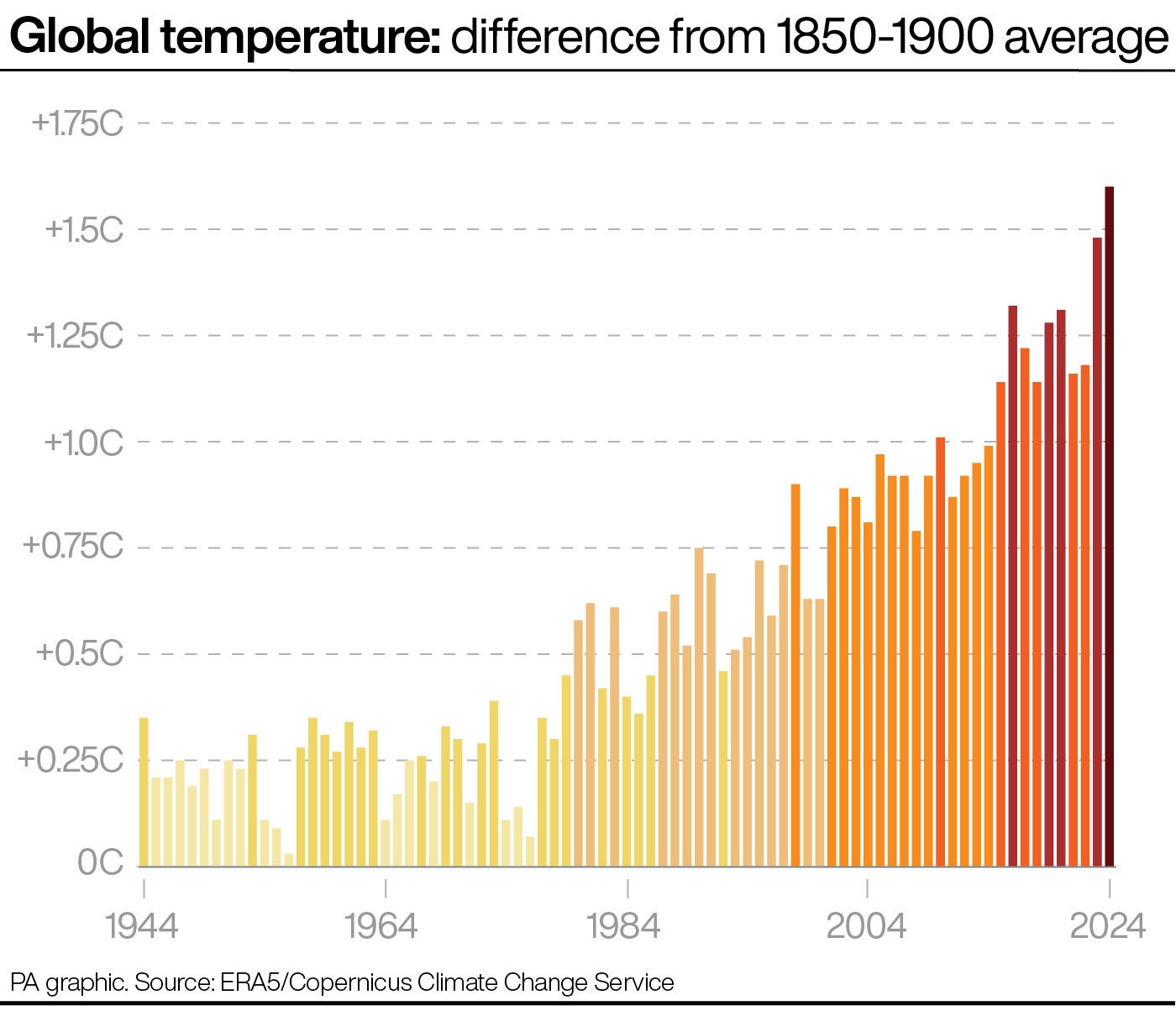
A year with temperatures more than 1.5C above pre-industrial levels mean it is likely the world is reaching the key long-term warming threshold, studies suggest.
Under the global Paris climate treaty secured in 2015, countries agreed to limit global warming to “well below” 2C and to pursue efforts to curb temperature rises to 1.5C above pre-industrial levels to avoid the worst impacts of extreme storms, floods, heatwaves, rising seas and the collapse of natural systems.
But global datasets of temperatures have found a record hot 2024 saw temperatures exceed 1.5C over the year for the first time.

Scientists caution that one year above 1.5C over pre-industrial levels does not mean the long-term threshold, measured over multiple decades, has been breached.
But two studies published in the journal Nature Climate Change have found it is likely the year at 1.5C means the world is in the 20-year period where the long term threshold will be exceeded – or even that we have already crossed it.
Scientists said the findings showed how urgently the world needed to act to cut the greenhouse gas emissions from burning fossil fuels, industrial processes and cutting down forests that are driving climate change.
In his study, Alex Cannon, from the Climate Research Division of Environment and Climate Change Canada, said that a few months or couple of years warmer than 1.5C does not “automatically mean the goal has been exceeded”.
But analysis of climate model projections show that 12 consecutive months above 1.5C indicates the Paris Agreement threshold is likely to have already been crossed, he said.
While an El Nino weather pattern in the tropical Pacific, which pushes up global temperatures, contributed to 2024’s record heat, the analysis shows that 1.5C for 12 consecutive months – regardless of El Nino conditions – usually occurs after the long-term threshold has been reached in simulations, he said.
The rate we have reached these levels is terrifying and shows, yet again, how urgently we need to act
He added that whether the findings signalled an earlier than expected crossing of the threshold in the real world depended on whether unaccounted-for factors, which are not considered in archived climate model simulations, played a large role in recent warming.
In a second paper, scientists from Germany looked at real-world observations of already-reached warming levels and climate models, and showed that the first single year exceeding each threshold have consistently fallen with the first 20 year period which averaged the same level of warming.
They found that “unless ambitious emissions cuts are implemented”, the world’s first year at 1.5C warming is “virtually certain” to fall within the 20-year period that reaches the 1.5C warming level.
They said it was very unlikely for the temperature of a single year to largely exceed the long term average, and 2024’s record heat signals that “most probably” Earth has already entered a 20-year period at 1.5C warming, they said.
Entering into the 20-year period in which temperatures averaged 1.5C did not mean that the world was already at long term warming of that level as that would fall in the mid point of the era, 10 years later, they added.
And they said that by rapidly slowing down the warming rate, stringent near-term action to curb climate change has the potential to substantially reduce risks of exceeding 1.5C of warming soon after the first year of heat at that level has occurred.
It does highlight that the headroom to stay below 1.5C is now wafer thin
And rapid, urgent emissions action is needed to limit peak warming, which is also required to hold climate change below 2C if the 1.5 target is missed.
“A year above 1.5C is not the time for despair, but a call to action,” they said.
Responding to the findings, Dr Alan Kennedy-Asser, senior research associate at the University of Bristol Cabot Institute for the Environment, described them as “sadly unsurprising” which suggested “we may be already living in the 1.5C world the Paris Agreement referred to”.
“However, even though the planet may be in a period that is at or exceeds 1.5C, there is great value in taking rapid action to slow further warming, as the rate of change matters and every tenth of a degree matters,” he said.
Dr Vikki Thompson, scientist at the Royal Netherlands Meteorological Institute, said: “These studies use data from both observational sources and multiple climate models to show we should now expect to exceed the Paris Agreement within the next 20 years, much sooner than climate projections had suggested.
“The rate we have reached these levels is terrifying and shows, yet again, how urgently we need to act.
“Without adaptation and mitigation we will continue to feel the impacts of the accelerating warming with more and more extreme weather events,” she said.
Professor Stephen Belcher, Met Office chief scientist, said a single year exceeding 1.5C “does not break the guardrail of the Paris Agreement”.
“However, it does highlight that the headroom to stay below 1.5C is now wafer thin,” he said, warning that a recent paper by Met Office scientists calculated current global warming at 1.3C and its forecast for carbon dioxide for the coming year is now inconsistent with pathways keeping to 1.5C.
“This suggests that only rapid and strong measures to cut greenhouse gas emissions will keep us from passing the first line of defence within the Paris Agreement,” he said.







